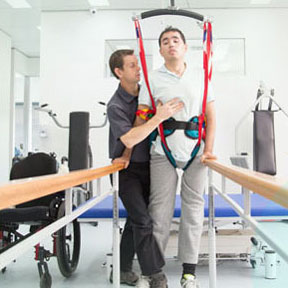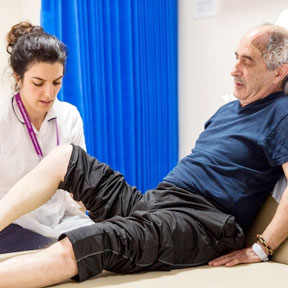How PhysioFunction Can Help with Spinal Cord Injury.
 Spinal CordIinjury (SCI) occurs when the spinal cord gets damaged following an accident, falls, sporting injuries, or following diseases, such as Polio, Spinal Bifida or Transverse Myelitis.
Spinal CordIinjury (SCI) occurs when the spinal cord gets damaged following an accident, falls, sporting injuries, or following diseases, such as Polio, Spinal Bifida or Transverse Myelitis.
The damage to the spinal cord might be due to severing (total or partial), crushing/compression, or over-stretching/tearing. It is not the same as having a “broken back/neck” as this refers to a fracture of one or more of the vertebrae (bones that make up the spine), which does not necessarily lead to spinal cord injury.
PhysioFunction's Neurological Physiotherapy treatment is aimed at addressing the problems that can occur following SCI so that an individual can maximise their potential for recovery and therefore maximise their independence.
Whether the personal injury to that individual has resulted in quadriplegia/tetraplegia or paraplegia, treatment should be focused on what their needs are. Once the physiotherapist has made their assessment, and the individual has expressed what they would like to achieve, an appropriate course of physiotherapy can be agreed which will aid an overall rehabilitation and maximise recovery..
Depending on the level of Spinal Cord Injury and its nature whether it be complete or incomplete, the problems associated can include:

Treatment should be focused upon that individual and tailored specifically to their condition. A treatment programme is formulated following a thorough physical assessment which might include:
Your physiotherapist might also be able to advise an individual on use of appropriate equipment such as wheel-chairs and pressure releasing cushions, exercise equipment and electrical muscle stimulators (EMS)/Functional Electrical Stimulation (FES) e.g. Odstock PACE, WalkAide, Bioness, Ottobock MyGait, Ottobock ActiGait, and Exoskeletons including REX.
With appropriate treatment and by challenging an individual during recovery, together with sound advice and encouragement, Neurological Physiotherapy can indeed maximise your independence.
Have Any Questions
Don't Hesitate to contact us and get the solution
Copyright © 2019 RONREHAB | All Right Reserved
